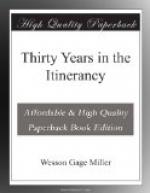To the soul who has no knowledge of these delightful experiences, there hangs a mystery around the Camp-Meeting, but to Christians the whole subject is as clear as the noon-day. Like the disciples on the mount of transfiguration, they are prepared to say, “Master, it is good for us to be here.” With them Christ is the central figure, and it is his presence that hallows the temple in the wilderness.
It is sometimes objected that the exercises at Camp-Meetings are too boisterous, and lead to extravagances. To this objection there are two replies. First, it must be conceded that Camp-Meetings are not the only meetings that may be denominated boisterous. At political meetings, and on other occasions, I have witnessed the equal, at least, of anything I have seen at Camp Meetings.
But the other reply is more to the point. No one can well deprecate the boisterous and extravagant in religion more than I do, and yet I accept both as a necessity. To move men to right action, they must be swayed by right influences. If men were susceptible to the good, then gentle influences might sway them, but as they are steeped in evil, and largely lost to the better influences, the sterner only can reach them. If this shall be found to be true in the individual, then certainly it is more emphatically true of men in the aggregate. To move a multitude, then, to the acceptance of Christ, the congregation must be put under an intense moral pressure. And it will be found that the measure of pressure that will move the great mass, will sometimes move individuals of peculiarly sensitive temperament over into the extravagant. Now in such cases, one of two things must be accepted. We must be content to leave the great aggregate unmoved, or we must endure the irregularities that are sometimes seen, not only at Camp-Meetings, but in all revivals of religion. We cannot accept the former, for it involves the ruin of perishing souls. Then, accepting the latter, we may not condemn what cannot be avoided, if the great end of Christian effort shall be realized. Human nature is a very strange combination, and it must be taken as it is. The religion of Christ proposes to save men, and to do so it must take us as we are. The wonder is not that it can make so little out of us, but rather, that it is able to make even a few fair specimens, while the balance of us are only indifferent ones. Yet I rejoice to know that even the poorest of us are vastly better than we would have been had it not been for the revelation of Christ in us.
CHAPTER XX.
Whitewater Conference.—Report on Slavery.—Election of Delegates.—Whitewater.—Early History.—Rev. Dr. Bannister.—General Conference.—Member of Mission Committee.—Conference 1860.—Rev. I.L. Hauser.—Mrs. I.L. Hauser.—Rev. J.C. Robbins.—The Rebellion.—Its Causes.—Fall of Sumter.—Extract of Sermon.—Conference 1861.—Rev. J.H. Jenne.—Rev. S.C. Thomas.—Rev. G.C. Haddock.—Colonelcy.—Close of Term.




